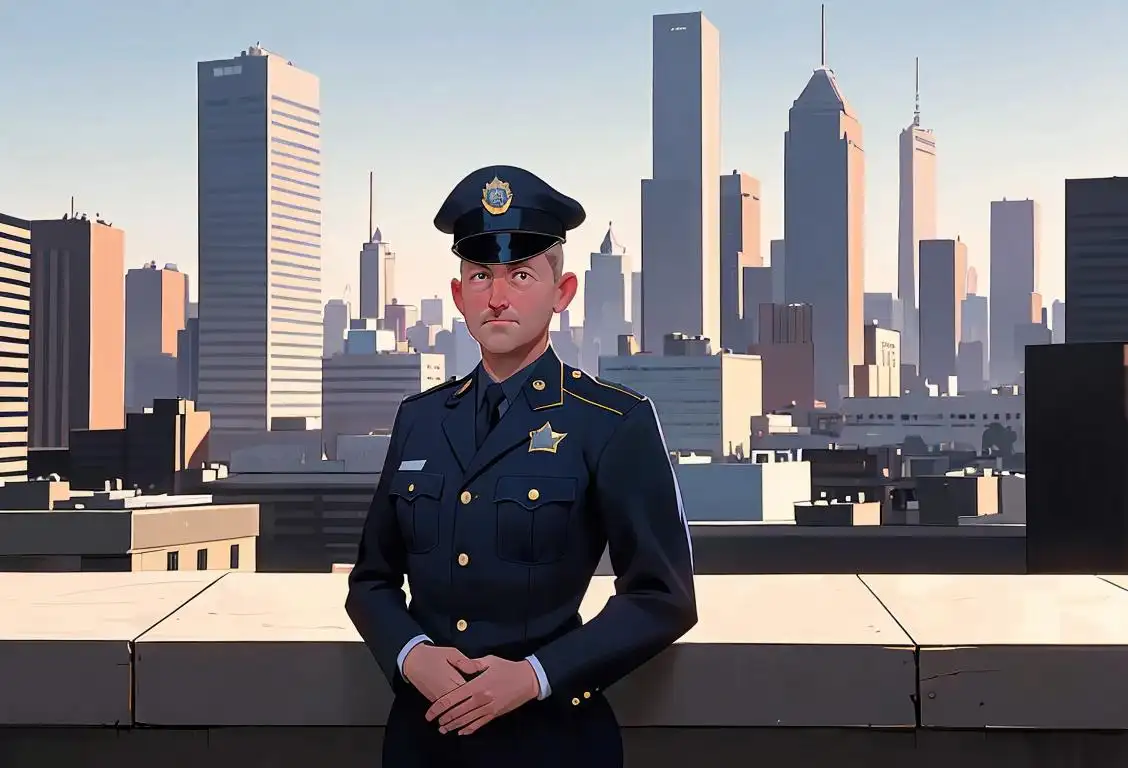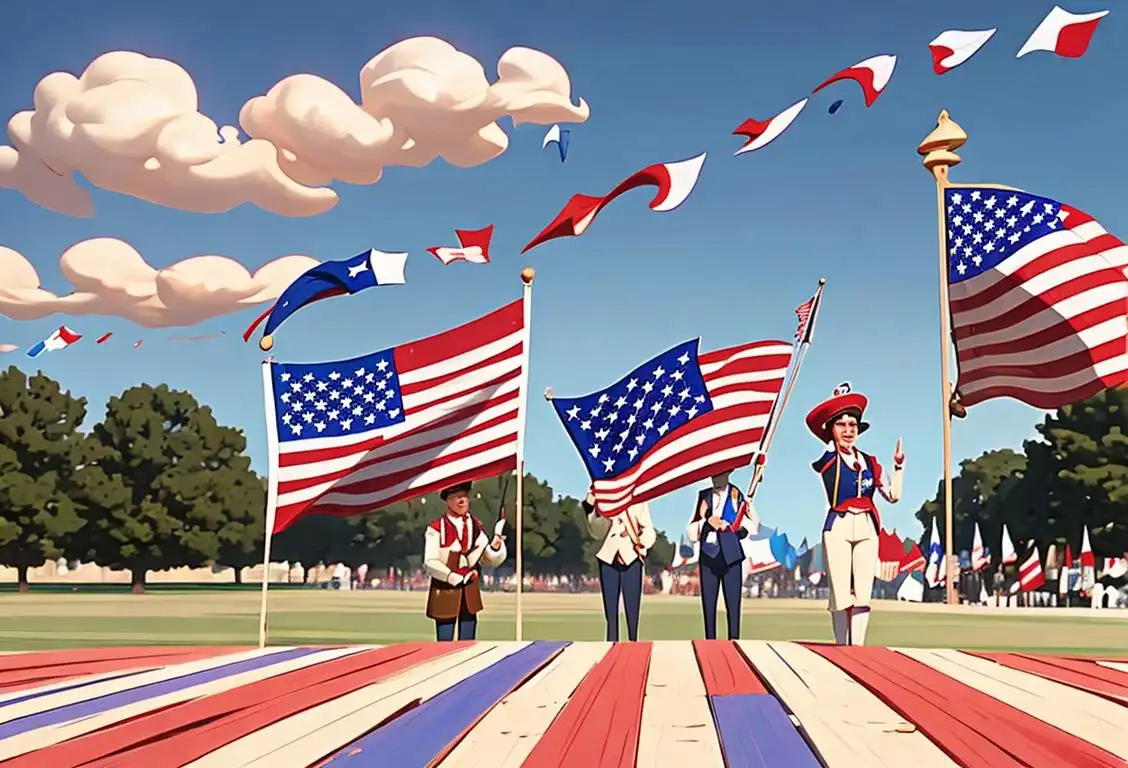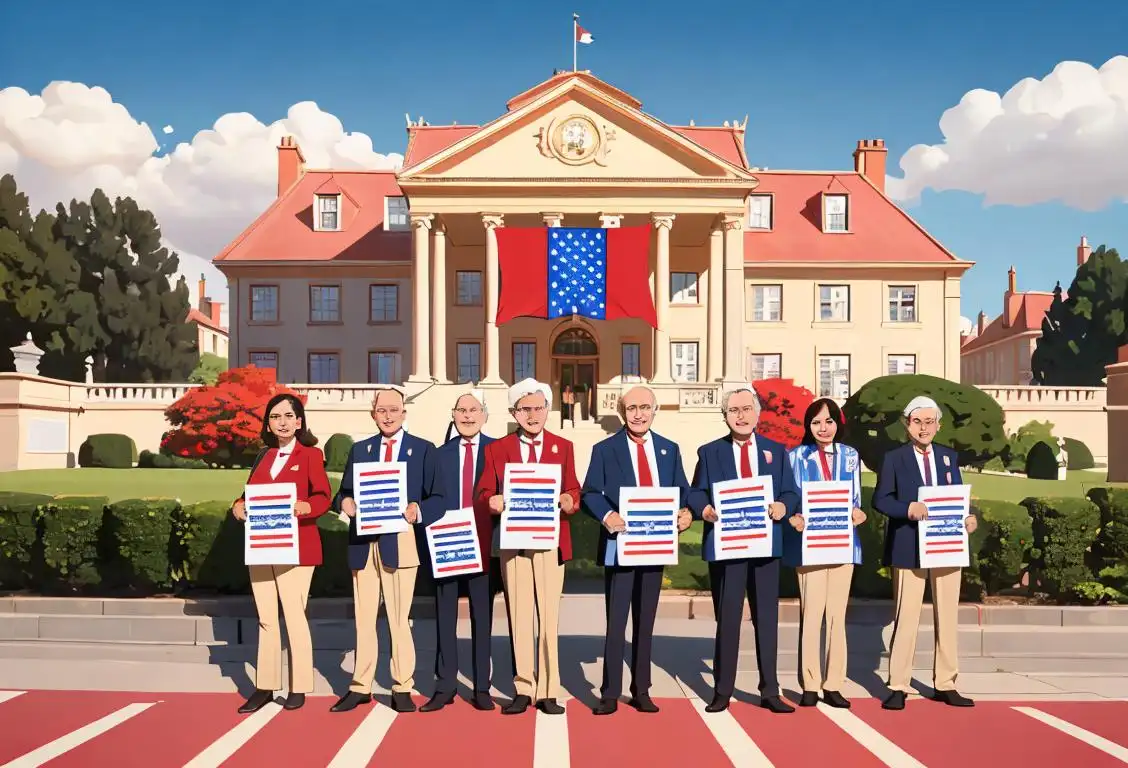National Peace Officers Day

Hey there, fellow internet historian! Are you ready to uncover the fascinating story behind National Peace Officers Day? Well, strap on your virtual detective hat and get ready for a thrilling ride!
When is Peace Officers Day?
It's national peace officers day on the 16th May.
The Birth of National Peace Officers Day
You know that heartwarming feeling when someone dedicates a day to recognizing the incredible work done by peace officers? That feeling of love and appreciation for those brave souls who keep our communities safe? Well, National Peace Officers Day is all about that warm and fuzzy sentiment. It's a day when we come together as a nation to honor and show gratitude to the men and women who dedicate their lives to maintaining law and order.
The origins of National Peace Officers Day can be traced back to May 15, 1962, when President John F. Kennedy signed a proclamation designating this special day. President Kennedy's intention was to create a day of remembrance for law enforcement officers who lost their lives in the line of duty. In the years that followed, May 15 became synonymous with honoring fallen officers and thanking those who continue to serve and protect.
How People Celebrate National Peace Officers Day
On National Peace Officers Day, you'll find a wide range of activities and gestures taking place across the country. Communities come together to organize memorial services, parades, and candlelight vigils to remember the brave officers who made the ultimate sacrifice.
Police departments and law enforcement agencies often hold ceremonies to recognize their officers' dedication and bravery. From awards and medals to heartfelt speeches, these events serve as a reminder to the officers that their hard work and sacrifices do not go unnoticed.
People also use this day to express their gratitude in smaller yet heartfelt ways. Maybe you'll see someone handing out thank-you cards or even bringing doughnuts to their local police station (because, let's face it, doughnuts make everything better).
The Bond between Peace Officers and the Community
It's worth mentioning the exceptional bond that exists between peace officers and the communities they serve. National Peace Officers Day not only brings people together to honor the officers, but it also reminds us of the collaborative effort required to maintain a safe and secure society.
Law enforcement officers rely on the support and trust of the community. They work tirelessly to build positive relationships, foster trust, and create a sense of unity. And these efforts don't go unnoticed. On National Peace Officers Day, communities embrace the opportunity to express their appreciation, reinforcing that strong bond between officers and citizens.
History behind the term 'Peace Officers'
1285
The Rise of Constables
In the year 1285, the term 'peace officers' began its journey with the rise of constables in England. Constables were appointed by justices of the peace and were responsible for maintaining peace and order within their jurisdictions. They were involved in apprehending criminals, preventing disturbances, and ensuring the safety of the community.
1667
The Beginnings
The term 'peace officers' originated in Britain during the late 17th century. In 1667, King Charles II established the first recognizable peace officer force known as the Bow Street Runners. Their primary responsibility was to maintain the peace and enforce law and order in the rapidly growing city of London. Their duties included apprehending criminals, preventing disturbances, and protecting the citizens.
1663
The Creation of the Office of Constable
In the year 1663, the term 'peace officers' began its journey with the creation of the office of Constable in England. The primary purpose of these law enforcement officers was to maintain peace and order within their communities. Constables were responsible for protecting the public, suppressing riots, serving court documents, and apprehending criminals.
1829
Creation of the London Metropolitan Police
The term 'peace officers' traces its roots back to the creation of the London Metropolitan Police in 1829. Sir Robert Peel, known as the father of modern policing, established the force in order to maintain peace and order in the city. The officers were often referred to as 'peace officers' due to their primary role of maintaining peace and preventing crime.
1660
The Evolution of Watchmen
During the restoration of the British monarchy in the year 1660, watchmen appeared on the scene as a significant development in the history of peace officers. Watchmen were responsible for guarding the streets, detecting crimes, and alerting citizens about potential dangers. They served as the early predecessors of modern-day police officers, laying a foundation for the term 'peace officers.'
1701
Introduction of the Term 'Peace Officer'
It wasn't until the year 1701 that the term 'peace officer' was officially used in legal statutes. The term was included in the English legal system to designate those individuals who had the authority to preserve and enforce the peace in society. This marked the formal recognition of peace officers as custodians of law and order.
1838
The Evolution in the United States
The term 'peace officers' later made its way to the United States. In 1838, the state of Texas established the first official peace officer agency, known as the Texas Rangers. Originally formed to protect settlers from native tribes and outlaws, the Texas Rangers gradually expanded their responsibilities to include general law enforcement duties. Their reputation for bravery, resourcefulness, and dedication in maintaining peace further popularized the term 'peace officers' in the country.
1873
Introduction of the Term 'Peace Officer' in the U.S.
The term 'peace officer' gained prominence in the United States with the introduction of the Frontier Peace Officers Association in 1873. This association aimed to bring together law enforcement officials from different parts of the country to share knowledge and experiences. The term 'peace officer' was used to describe those individuals responsible for keeping the peace in frontier towns and settlements.
1921
Standardization of Terminology
In 1921, the International Association of Chiefs of Police (IACP) was formed to establish standards and best practices within the law enforcement community. As part of these efforts, the IACP standardized the terminology used to describe law enforcement officials. The term 'peace officers' was officially recognized to encompass various roles, including police officers, sheriff's deputies, and other law enforcement personnel committed to maintaining peace in their respective communities.
1789
Development of US Marshal Service
In the year 1789, the United States Marshal Service was established as the principal law enforcement agency in the federal government. The US Marshals, as they came to be known, were tasked with maintaining order and security in the new nation. This marked a significant step in the evolution of peace officers in the United States.
1893
The Birth of the Modern Concept
In 1893, the International Association of Chiefs of Police (IACP) was founded. The IACP aimed to establish professional standards for law enforcement and promote the idea of peace officers serving as guardians of the community. This marked a shift in perspective from merely enforcing the law to actively preserving the peace and ensuring public safety. The term 'peace officers' gained further recognition and respect within law enforcement agencies worldwide.
1791
Creation of the United States Marshals Service
The United States Marshals Service, established in 1791, played a pivotal role in shaping the concept of peace officers. They were entrusted with enforcing federal laws, serving court documents, apprehending fugitives, and maintaining order in frontier regions. This marked an important milestone in the recognition of peace officers as a crucial component of law enforcement.
1960s
Expansion of Peace Officer Roles
During the 1960s, the role of 'peace officers' expanded beyond traditional law enforcement functions. They became more involved in community outreach initiatives, conflict resolution, and crime prevention programs. This shift reflected a broader recognition that building positive relationships between law enforcement and communities was crucial for maintaining peace and minimizing crime.
1960s
Expanding Roles and Specializations
During the 1960s, peace officers faced new challenges and expanded their roles to effectively handle civil rights movements and social unrest. They played a crucial role in maintaining peace during significant events such as the Montgomery bus boycott and the March on Washington. Additionally, peace officers started specializing in various fields like community policing, criminal investigation, and specialized tactical units, further enhancing their effectiveness in ensuring peace and justice.
1873
Formation of the Texas Rangers
The year 1873 saw the formation of the Texas Rangers, which played a crucial role in shaping the concept of peace officers in the American West. Originally created to counter crime and provide protection in the vast and lawless frontier, the Texas Rangers became an iconic symbol of rough justice and order in the face of adversity.
1838
Introduction of the Term 'Peace Officers'
The term 'peace officers' was officially introduced in the Penitentiary Act of 1838 in Great Britain. The act outlined the roles and responsibilities of various law enforcement personnel, including constables, headboroughs, and other officers responsible for preserving the peace. This legislative recognition solidified the term 'peace officers' as a common reference for individuals tasked with maintaining law and order.
Present
Modern-Day Peace Officers
In the present day, peace officers continue to play a vital role in maintaining peace and upholding the law. They work diligently to protect communities and build positive relationships with the people they serve. The term 'peace officers' has become a symbol of dedicated professionals who strive to keep society safe and secure. National Peace Officers Memorial Day, observed on May 15th each year, honors the sacrifices made by peace officers in the line of duty.
Modern Day
Evolution of Peace Officer Duties
In modern times, 'peace officers' continue to play a vital role in maintaining law and order. However, their responsibilities have evolved to address a wide range of challenges, including cybercrime, terrorism, and societal issues. Peace officers often work collaboratively with other agencies and entities, emphasizing the importance of community engagement and proactive policing strategies.
1929
Introduction of the Term 'Police Officer'
In 1929, the term 'peace officer' underwent a shift as 'police officer' gained popularity and became the commonly used term for law enforcement officials. As modern policing techniques and organizations were established, the term 'police officer' represented a more formal and professional approach to maintaining peace and upholding the law.
1873
Peace Officers in Texas
The establishment of the Texas Rangers in 1873 played a significant role in popularizing the term 'peace officers' in the United States. The Texas Rangers were tasked with protecting the frontier, investigating crimes, and maintaining peace in the ever-expanding state of Texas. Their actions, often romanticized through folklore and popular culture, further elevated the image and significance of peace officers.
1967
Miranda Rights and Police Professionalism
The year 1967 marked a significant turning point in the role and perception of peace officers. The landmark Supreme Court decision in Miranda v. Arizona established the requirement for law enforcement officers to inform suspects of their rights upon arrest. This ruling aimed to protect individual rights and promote professionalism among peace officers, emphasizing the importance of due process and fair treatment.
Did you know?
Did you know that the earliest form of organized policing dates back to ancient times? In ancient Egypt, a pharaoh by the name of Amenemhat I established the first police force around 2040 BCE. Talk about ancient crime fighters!Tagged
fun rememberanceFirst identified
11th May 2015Most mentioned on
16th May 2018Total mentions
75Other days
Cancer Survivors Day
Suicide Prevention Day
Flag Day
Pumpkin Day
Memorial Day
Bestfriends Day
Heroes Day
Liberation Day
Unemployed Day
Voters Day









